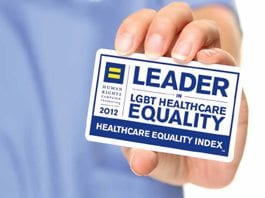The United State’s system of health care continues it’s progression in providing all-inclusive services since the repeal of the Defense of Marriage Act. Monday, July 1st , the Centers for Medicare and Medicaid Services (CMS) issued an official policy announcement declaring same-sex partners be given equal visitation rights at long-term care facilities regardless of their marital status. This new guidance policy applies to all long-term care health facilities receiving Medicare and Medicaid funding to include nursing homes and hospice facilities.
How does this effect agencies and staff?
Now that medical facilities are encouraged to be more inclusive of LGBTQ individuals and families, agencies are encouraged to evaluate existing programs and services as well as staff supports.
A useful tool that can be used by agencies is the Health Equality Index (HEI) developed by the Human Rights campaign and the Gay and Lesbian Medical Association (GALMA). The HEI measures the effectiveness of services provided to LGBTQ individuals.

The HEI tests for the “core four”
- Patient Non-Discrimination
- Equal Visitation
- Employment Non-Discrimination
- Training in LGBT Patient-Centered Care
Responses to these questions are returned to the participating agencies in a comprehensive document for their use in service planning.
The U.S. Department of Health and Human Services Secretary Kathleen Sebelius describes the HEI as “an important tool for making sure LGBT individuals and families are treated with the same respect and care in these situations as anyone else. It shines a light on what our country’s health institutions are doing to better serve LGBT patients. And it’s very encouraging to see more institutions being recognized as “Leaders in LGBT Healthcare Equality.” Read More…
Participating organizations reap several benefits including free online training for staff at all levels,a customized needs assessment for planning, as well as featured status in the HEI report as Equality Leaders.
Registration is free and open to all healthcare organizations in the U.S. with ten or more employees, whether inpatient or outpatient, network or individual facility.
The following are some Suggestions for Medical Staff interacting with LGBTQ Patients:
- Assumptions: Do not assume the sexual identity or orientation of your patient please ask in a proper manner.
- Education: Learning about LGBTQ sexuality and sexual practices this will allow healthcare providers to better assess patients support.
- Language: Be aware of the language used and as well as cultural nuances of the LGBTQ population, including celebrations of the community such as gay pride, symbols that are representative such as rainbow flags and pink triangles and terms like butch, femme, dyke, and queer.
- Communication: Properly educate patients about the effect of illnesses and the medical treatments on sexuality.
- Compassion: Provide sensitive and compassionate service, if uncomfortable with learning about a patient’s sexuality be honest and let a patient know.
- Respect: Be respectful of a patient and the information they are sharing, this includes confronting coworkers of inappropriate comments.




